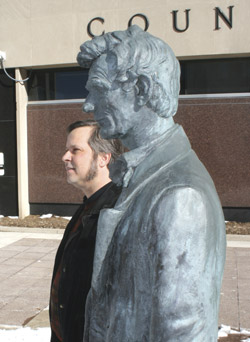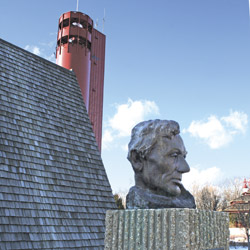Brian “Fox” Ellis is a storyteller, author, performer and educator from Peoria. He is also a museum consultant who has worked with the Abraham Lincoln Presidential Library and Museum, the Looking for Lincoln tourism board, The Field Museum and countless other nature centers and historical societies. Fox is the author of eleven books and the artistic director for Prairie Folklore Theatre.
To celebrate the 200th birthday of Abraham Lincoln, he has developed four programs, excerpted here, that look at the life of our 16th president from different perspectives. art & society spoke with Fox on January 19th, just as he was about to kick off two solid months of performances.
How did you get your start telling tales of Lincoln?
As a historical storyteller, I was a big fan of Lincoln even before I moved to Illinois in 1993—of course, he’s somebody that a lot of people look up to. But I will admit that when I moved here…it’s hard not to be a fan of Lincoln. This series of programs really had its birth around the sesquicentennial of Lincoln, Illinois, a town that he christened with a watermelon. He laid it out as a surveyor, and it was the first town named in his honor. At that point, he was barely a state legislator! But Lincoln, Illinois, hired me for the sesquicentennial, and that’s where this program was born.
 How did you select the four friends of Lincoln whom you portray?
How did you select the four friends of Lincoln whom you portray?
Well, there are a lot of people who portray Lincoln, but I’m not tall enough, and I don’t look anything like him. I also know, as a writer and performer, that if I limit myself to Lincoln, I can only say what Lincoln said. But by choosing an unknown character, it gives me a lot of room, a lot of leeway.
By choosing Austin Gullaher…it’s someone who knew Lincoln intimately. After I got into the research, I discovered that not only did Austin Gullaher know Lincoln in Kentucky—they were boyhood friends—but the Gullahers moved to New Salem right before Lincoln did. This character had an intimate relationship with Lincoln throughout his youth into early adulthood, and so it gives me a unique perspective. Also, I know that Gullaher survived Lincoln’s assassination—if I were Lincoln, I couldn’t talk about my assassination, because I’d be dead! But as someone who knew Lincoln intimately, I can speak about how the nation responded…so this character gives me a lot of room, but also a sense of intimacy, and becomes a bridge for the audience.
I’ve done the Gullaher show for eight or nine years now, but as I kept digging deeper and learning more about Lincoln, I found these real gems of stories that are relatively unknown—that I thought could bring a new perspective. So out of the Gullaher show, I started developing programs around “Lincoln the Lawyer.” I thought, why not step into the shoes of Billy Herndon? Herndon knew Lincoln’s law career intimately, since they were partners, and not many people know a lot about Herndon, who was a colorful character in his own right. He published one of the most controversial biographies on Lincoln, so he not only knew him firsthand, but he interviewed hundreds of Lincoln’s friends and collected lots of stories that have become the fodder for every Lincoln biographer since. So Herndon was a natural.
Walt Whitman was a roundabout road…Walt Whitman chose me! I’ve always been a fan of his poetry, and when I was first learning to be a storyteller, one of my friends, a Broadway actor, was coaching me on elocution and enunciation. He did this by walking around New York City, reading Walt Whitman’s poetry to anybody who would listen, in the places that Whitman wrote about or where he actually wrote the poem. One of my favorites was “Crossing Brooklyn Ferry.” So we stood there by the Brooklyn Bridge (which in Whitman’s time hadn’t been built yet), and we read aloud Whitman’s view of Manhattan from the Brooklyn ferry. It was a wonderful learning experience for me, not just the technical aspects of public speaking and oration, but a real immersion into the life of Whitman.
And so Whitman has kind of followed me around…but a couple years ago, after doing this Lincoln show in Lincoln, Illinois, Lee Gurga, a dentist in Lincoln who is also a Whitman scholar and poet, said, “Have you ever thought about presenting as Whitman?” So I dove into the research, and Dr. Gurga helped by providing books and proofreading my script—then he actually commissioned the show and paid me for my first performance. I found that Whitman was more than just a fan of Lincoln—that they had a genuine mutual admiration where Lincoln read Whitman’s poetry aloud to clients in his law office, and of course, one of Whitman’s most famous poems was his eulogy to Lincoln’s assassination. So it’s just a real natural marriage.
The Civil War character—he is a real guy from Peoria, and I originally found him in the cemetery at Springdale. Every year, I host the Springdale Cemetery Tour, and I portrayed him in 2006. That show is much more about the war, but it includes several great Lincoln stories and kind of a soldier’s view of Lincoln. I included a Whitman poem—Whitman wrote eloquently about the war—and so it’s a mix of literature from that era from the perspective of the soldier who was there, Matthias Stritt. A fascinating character, born in Germany, came to America as a boy, moved to Peoria to work in the Peoria Plow Works—what later became Avery Tractor in Averyville—and then was the first to enlist in the Civil War in Peoria. The first name on the rolls was Matthias Stritt.
Describe the process of creating scripts for each of your characters.
Well, the Gullaher show was basically a list of stories. The entire script fit on one index card—it was just the titles of stories and songs—the order, the playlist. But the Whitman show, because it is a lot of poetry, was a pretty intense editing process. With a lot of the shows that I write, I try to find period documents and newspaper accounts—I want you to hear their voice. So, because it’s public domain, copyright-free material, I use as much of their words as I can. With Whitman, because he published so much great poetry, the hardest part was cutting away…what do I not have time for? The good news is that it’s a distillation of the best of Whitman’s material that personally reflects Lincoln’s life. All I had to write were the segues—just the little stories that kind of tie it together—trying to figure out how I move from Whitman and Lincoln’s perspective on slavery, to what led to Lincoln’s election, and Whitman’s first encounter with Lincoln to the Civil War, tying those stories together.
Describe your performance schedule in this bicentennial anniversary of Lincoln’s birth.
From the middle of January to the middle of March, I am working every single day. And really crazy things, like five to seven shows a day, sometimes in two or three different towns. It’s not uncommon for me to be at one library in the morning—drive three hours to get there—drive a half-hour across town to another library, an hour and a half to a third library in the evening, and then three hours home. It’s crazy-busy, but I love it. I’m doing more than a hundred Lincoln shows this year—probably 50 just in February and March. The Chicago Public Library hired me for 40 programs this summer, so I’ll be really busy up there.
How much of your work this year involves Lincoln?
I would say that Lincoln is more than a third of what I’m doing right now. I’m also Charles Darwin, who shares a birthday with Lincoln. I’m also John James Audubon—I’ve been touring as Audubon for about eight or 10 years as well, and so I do a lot of birding festivals and wilderness festivals. I’ll be in Denver this November, and within a 48-hour period, I’ll be Lewis and Clark, John James Audubon, and Charles Darwin. I would say Lincoln is at least a third of my shows. There has been a steady incline, and I think it will peak this year, and hopefully a long, slow descent, so Lincoln will keep me busy for years to come.
What is a story about Lincoln that most people don’t know?
Two stories come to mind that are in the play I just wrote. When Lincoln was a lawyer in Illinois, he was hired by the Illinois Central Railroad because the state wanted the railroad to pay state property taxes, but the federal edict had given land to the railroads tax-free as an incentive to build rails. And Lincoln argued eloquently that the federal laws in this instance supersede the state laws, and the railroad does not have to pay state taxes, saving them hundreds of thousands of dollars. But when he went to collect his bill, the future General George McClellan—who was a railroad tycoon before he was the infamous Civil War general, and then later ran against Lincoln in his second election—refused to pay Lincoln his fee. He thought it was astronomical. Lincoln’s friends said, “Look, you’ve saved them hundreds of thousands of dollars in past taxes, and potentially millions of dollars in future taxes—you should double what you ask for, and we’ll take care of it.” It went to arbitration, and the arbiters said McClellan must pay Lincoln $5,000, making him the highest-paid lawyer in America in his day. It was kind of neat the way he stood down this other little giant.
And then Edwin Stanton, who he also ran against. Stanton was supposed to win the presidential election—it was going to be Stanton, the governor of New York, or Salmon Chase, governor of Ohio, both of whom had a lot more political clout in this newly-founded Republican Party. Lincoln, wisely, was the second choice of all of the delegates. His supporters said, if your man doesn’t win in the first round, can Lincoln be your second choice? Because Chase’s supporters hated Stanton, and Stanton’s supporters hated Chase—that’s how he won the election.
While a young lawyer, Lincoln was hired by McCormick Reaper for a case in Cincinnati. Lincoln did all the research and set up the lines of argument to win the case, and at the last minute, McCormick Reaper said it probably needed an Ivy League lawyer, and they hired Stanton, who came in by train. Stanton just marched in, took over and won the case, using Lincoln’s research. And so Lincoln was really put off by this, but he got paid well for the case. But here he is encountering his future political rivals, while he’s this country bumpkin lawyer, and they don’t even pay attention to him—they diss him left and right— but he gets a view of them that helps to beat them later on. It’s intriguing, all of these little connections. a&s



